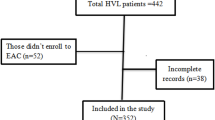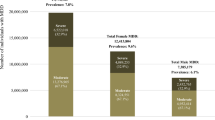Abstract
The heightened risk of persons with serious mental illness to contract and transmit human immunodeficiency virus (HIV) is a public health problem. Here we evaluate the interaction between psychiatric diagnosis and response to a community based-intervention targeted at treatment adherence in 236 HIV+ persons with co-occurring mental illness. To examine differential effectiveness of the intervention for categories of patient diagnosis, we reanalyzed the data after stratifying participants into two diagnostic groups: (1) participants with depressive disorders without psychosis and (2) participants with a psychotic or bipolar disorder. Outcomes included viral load and mental health quality of life (SF-12 Mental Health). We found that HIV+ persons with non-psychotic depressive disorders demonstrated a larger decrease in HIV viral load and more improvement in measures of mental health quality of life when compared to HIV+ persons with psychotic and bipolar disorders. We suggest that successful adherence interventions should be informed by psychiatric symptomatology. Trial registration: clinicaltrials.gov 29 identifier NCT00264823.


Similar content being viewed by others
References
Susser E, Valencia E, Conover S. Prevalence of HIV-infection among psychiatric patients in a New York City men’s Shelter. Am J Public Health. 1993;83(4):568–70.
Rothbard AB, Blank MB, Staab JP, et al. Previously undetected metabolic syndrome and infectious diseases among psychiatric inpatients. Psychiatr Serv. 2009;60(4):534–7.
Walkup J, Crystal S, Sambamoorthi U. Schizophrenia and major affective disorder among medicaid recipients with HIV AIDS in New Jersey. Am J Public Health. 1999;89(7):1101–10.
Kessler RC, Birnbaum H, Demler O, et al. Prevalence and correlates of nonaffective psychosis: results from NCS-R. Biol Psychiatry. 2005;57(8):108S–9S.
Blank MB, Mandell DS, Aiken L, Hadley TR. Co-occurrence of HIV and serious mental illness among Medicaid recipients. Psychiatr Serv. 2002;53(7):868–73.
Himelhoch S, McCarthy JF, Ganoczy D, Medoff D, Dixon LB, Blow FC. Understanding associations between serious mental illness and HIV among patients in the VA health system. Psychiatr Serv. 2007;58(9):1165–72.
Lopes M, Olfson M, Rabkin J, et al. Gender, HIV status, and psychiatric disorders: results from the National epidemiologic survey on alcohol and related conditions. J Clin Psychiatry. 2012;73(3):384–91.
Blank MB, Hennessy M, Eisenberg MM. Increasing quality of life and reducing HIV burden: The path+ intervention. AIDS Behav. 2014;18(4):716–25. doi:10.1007/s10461-013-0606x.
Wagner GJ, Kanouse DE, Koegel P, Sullivan G. Adherence to HIV antiretrovirals among persons with serious mental illness. AIDS Patient Care STDs. 2003;17(4):179–86.
Helleberg M, Pedersen MG, Pedersen CB, Mortensen PB, Obel N. Associations between HIV and schizophrenia and their effect on HIV treatment outcomes: a nationwide population based cohort study in Denmark. Lancet HIV. 2015;2(8):e344–50.
Hartzell JD, Janke IE, Weintrob AC. Impact of depression on HIV outcome in the HAART era. J Antimicrob Chemother. 2008;62(2):246–55.
Springer SA, Dushaj A, Azar MM. The impact of DSM-IV mental disorders on adherence to combination antiretroviral therapy among adult persons living with HIV/aids: a systematic review. AIDS Behav. 2012;16(8):2119–43.
Horberg MA, Silverberg MJ, Hurley LB, et al. Effects of depression and selective serotonin reuptake inhibitor use on adherence to highly active antiretroviral therapy and on clinical outcomes in HIV-infected patients. JAIDS. 2008;47(3):384–90.
Sin NL, DiMatteo MR. Depression treatment enhances adherence to antiretroviral therapy: a meta- analysis. Ann Behav Med. 2014;47(3):259–69.
Moore DJ, Posada C, Parikh M, et al. HIV-infected individuals with co-occurring bipolar disorder evidence poor antiretroviral and psychiatric medication adherence. AIDS Behav. 2012;16(8):2257–66.
Walkup JT, Akincigil A, Chakravarty S, et al. Bipolar medication use and adherence to antiretroviral therapy among patients with HIV-AIDS and bipolar disorder. Psychiatr Serv. 2001;62(3):313–6.
Mellins CA, Havens JF, McDonnell C, et al. Adherence to antiretroviral medications and medical care in HIV-infected adults diagnosed with mental and substance abuse disorders. AIDS Care. 2009;21(2):168–77.
Palmer NB, Salcedo J, Miller AL, Winiarski M, Arno P. Psychiatric and social barriers to HIV medication adherence in a triply diagnosed methadone population. AIDS Patient Care STDs. 2003;17(12):635–44.
Chiles JA, Lambert MJ, Hatch AL. The impact of psychological intervention on medical cost offset: a meta-analytic review. Clin Psychol Sci Pract. 1999;6(2):204–20.
Gilmer T, Stefancic A, Ettner S, Manning W, Tsemberis S. Effect of full service partnerships on homelessness, use and costs of mental health services, and quality of life among adults with serious mental illness. Arch Gen Psychiatry. 2010;67(6):645–52.
Rosenheck R, Kasprow W, Frisman L, Liu-Mares W. Cost-effectiveness of supported housing for homeless persons with mental illness. Arch Gen Psychiatry. 2003;60(9):940–51.
Blank MB, Eisenberg MM. Tailored treatment for HIV+ persons with mental illness: the intervention cascade. J Acquir Immune Defic Syndr. 2013;63:S44–8.
Blank MB, Himelhoch S, Walkup J, Eisenberg MM. Treatment considerations for HIV-infected individuals with severe mental illness. Curr HIV/AIDS Rep. 2013;10(4):371–9. doi:10.1007/s11904-013-0179-3.
Collins L, Murphy S, Bierman K. A conceptual framework for adaptive preventive interventions. Prev Sci. 2004;5(3):185–96.
Ware JE Jr, Kosinski M, Keller SD. A 12-item short-form health survey: construction of scales and preliminary tests of reliability and validity. Med Care. 1996;34(3):220–33.
Salyers MP, Bosworth HB, Swanson JW, Lamb-Pagone J, Osher FC. Reliability and validity of the sf-12 health survey among people with severe mental illness. Med Care. 2000;38(11):1141–50. doi:10.2307/3767812.
Chum A, Skosireva A, Tobon J, Hwang S. Construct validity of the SF-12v2 for the homeless population with mental illness: an instrument to measure self-rported mental and physical health. PLoS ONE. 2016;11(3):e0148856.
Curran P, Hussong A. Structural equation modeling of repeated measures data: Latent curve analysis. In D. Moskowitz & S. Hershberger (Eds.), Modeling intraindividual variability with repeated measures data. Mahwah: Lawrence Erlbaum. 2002; pp. 59–85.
Curran P, Muthén B. The application of latent curve analysis to testing developmental theories in intervention research. Am J Community Psychol. 1999;27:567–95.
Barnes G, Reifman A, Farrell M, Dintcheff B. The effects of parenting on the development of adolescent alcohol misuse: a six-wave latent growth model. J Marriage Family. 2000;62:175–86.
Fergus S, Zimmerman M, Caldwell CH. Growth trajectories of sexual risk behavior in adolescence and young adulthood. Am J Public Health. 2007;97:1096–101.
Bollen K, Curran P. Latent curve models. New Jersey: Wiley; 2006.
Biesanz J, Deeb-Sossa N, Papadakis A, Bollen K, Curran P. The role of coding time in estimating and interpreting growth curve models. Psychol Methods. 2004;9(1):30–52.
Geiser C. Data analysis with mplus. New York: Guilford; 2013.
Wagner GJ, Goggin K, Remien RH, et al. A closer look at depression and its relationship to HIV antiretroviral adherence. Ann Behav Med. 2011;42(3):352–60.
Velligan DI, Weiden PJ, Sajatovic M, et al. The expert consensus guideline series: adherence problems in patients with serious and persistent mental illness. J Clin Psychiatry. 2009;70(Suppl 4):1–46.
Arango C, Amador X. Lessons learned about poor insight. Schizophr Bull. 2001;37(1):27–8.
Crowe M, Porter R, Inder M, Lacey C, Carlyle D, Wilson L. Effectiveness of interventions to improve medication adherence in bipolar disorder. Aust N Z J Psychiatry. 2012;46(4):317–26. doi:10.1177/0004867411428101.
Berk L, Hallam KT, Colom F, et al. Enhancing medication adherence in patients with bipolar disorder. Hum Psychopharmacol. 2010;25(1):1–16. doi:10.1002/hup.1081.
Vieta E. Improving treatment adherence in bipolar disorder through psychoeducation. J Clin Psychiatry. 2005;66(Suppl 1):24–9.
Sajatovic M, Davies M, Hrouda DR. Enhancement of treatment adherence among patients with bipolar disorder. Psychiatr Serv. 2004;55(3):264–9.
El-Mallakh P, Findlay J. Strategies to improve medication adherence in patients with schizophrenia: the role of support services. Neuropsychiatr Dis Treat. 2015;11:1077–90.
Haynes RB, Yao X, Degani A, Kripalani S, Garg A, McDonald HP. Interventions to enhance medication adherence. Cochrane Database Syst Rev. 2005;167:540–9.
Mijch AM, Judd FK, Lyketsos CG, Ellen S, Cockram A. Secondary mania in patients with HIV infection: are antiretrovirals protective? J Neuropsychiatry Clin Neurosci. 1999;11(4):475–80.
de Ronchi D, Faranca I, Forti P, et al. Development of acute psychotic disorders and HIV-1 infection. Int J Psychiatry Med. 2000;30(2):173–83.
Julius RJ, Novitsky MA Jr, Dubin WR. Medication adherence: a review of the literature and implications for clinical practice. J Psychiatr Pract. 2009;15(1):34–44.
Funding
This research was supported by Grants from National Institute on Drug Abuse (RO1-DA-015627 ‘‘HIV Prevention Program among Substance Abusing SMI”), the National Institute for Nursing Research (RO1-NR-008851 ‘‘Nursing Intervention for HIV Regimen: Adherence among SMI’’), Penn Mental Health AIDS Research Center (PMHARC - P30MH097488-04) and Penn Center for AIDS Research (CFAR - P30-AI-45008-18).
Author information
Authors and Affiliations
Corresponding author
Ethics declarations
Conflict of interest
The authors declare that they have no conflict of interest.
Ethical Approval
All procedures performed in studies involving human participants were in accordance with the ethical standards of the institutional and/or national research committee and with the 1964 Helsinki declaration and its later amendments or comparable ethical standards.
Informed Consent
Informed consent was obtained from all individual participants included in the study.
Rights and permissions
About this article
Cite this article
Dalseth, N., Reed, R.S., Hennessy, M. et al. Does Diagnosis Make a Difference? Estimating the Impact of an HIV Medication Adherence Intervention for Persons with Serious Mental Illness. AIDS Behav 22, 265–275 (2018). https://doi.org/10.1007/s10461-017-1795-5
Published:
Issue Date:
DOI: https://doi.org/10.1007/s10461-017-1795-5




